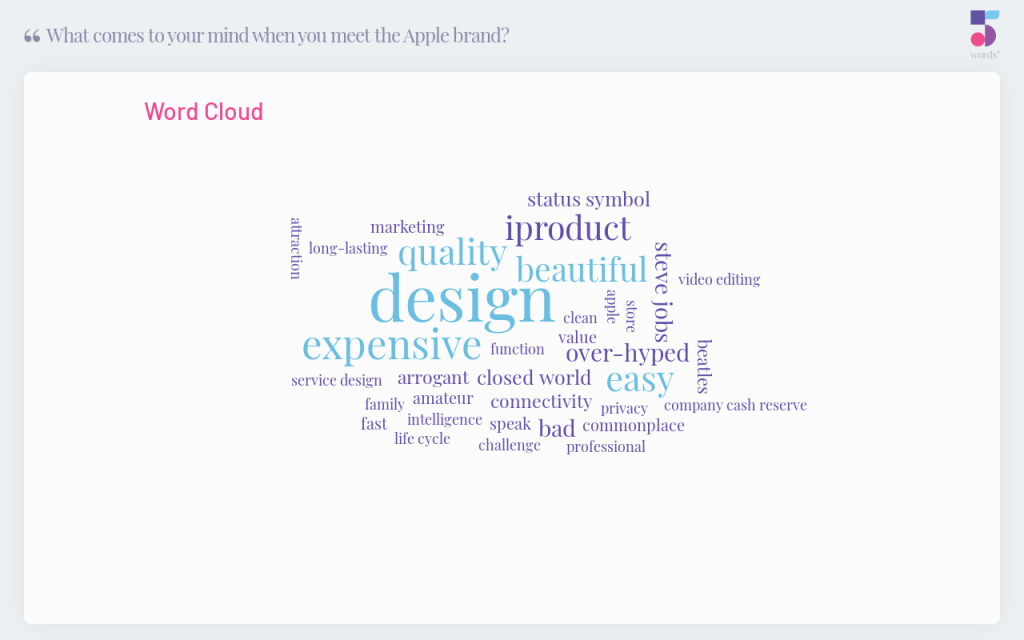Apple is presented as the primary example of branding strategies in most marketing and advertising studies. There it is usually stated that the company owns its success to the “look” and “feel” of their products, rather than its technical achievements. We wanted to unpack this claim and dig a bit deeper to look behind the usual cliches. What do you think the Apple brand reflects? We ran a survey in our audience, and asked participants to put in their 2 cents and answer in 5-WORDS.
Design, as the most defining aspect of the Apple brand, was the word group mentioned most by our respondents. ‘Metal’, ‘white’, ‘perfection’, ‘smooth’, ‘minimalism’. Which other tech company could that be, right? And what other brands could claim such a tight bond to these adjectives?
‘Expensive’, ‘easy’, and ‘quality’ have a kind of shared second place, and when we think of the technical milieu that Apple emerged from, it is easy to understand why. Just a few decades ago computers, laptops, and other gadgets were made for the techies by the techies. Technical parameters defined quality, price, and desirability. Then along came Apple, bringing design in the equation. All those professionals who needed the computational power, but did not know or care about the nuts and bolts of the technology, finally had a company that provided them with a slick product. Apple gave its users just enough operational freedom, so they wouldn’t have to become a system administrator on top of whatever it was they did for a living.
Once you recognize that a super laptop with a subpar user interface is like a Ferrari equipped with a rein in place of a steering wheel, it all seems obvious. Why not invest in user experience? Focusing solely on technical mandates when developing new devices is customer rationality misunderstood. People are ready to pay more for not only ease of use, but also the sheer (and undeniable) beauty of the products, as well as the feeling that they are amongst the free thinkers, the nonconformists. So Apple quickly became the favorite of city creatives and developed a loyal following of users who were hurdled neither by price, nor by the incompatibility of Apple devices with other tools, services, and operating systems.

But do opinions differ if we group answers by who uses Apple products and who does not? Well, yes and no. The most common answers were Shared Words (used both by users and non-users,) but a very important adjective, ‘easy’, was mentioned only by Apple users. Could it be because non-users do not personally experience the ease of use, so it doesn’t come to mind, or do they not really care about that aspect? Other Shared Words also show us in some detail why so many people mentioned the price issue: even Apple users mentioned ‘over-hyped’, ‘status symbol’, and simply just ‘bad’.
Apple navigated the waters of the ever-changing market exceptionally and hit the perfect balance between developing truly innovative devices and projecting the sexy smooth design. Apple has been the rebel, the free-thinker amongst its peers. It could successfully maintain an air of mystery, and the image of constant innovation, but it seems like people are catching up to the trick and are demanding more for their money. Could it be time for Apple to Think Differently?

Further readings about Apple and its branding strategies:
- Apple: It’s All About the Brand (Wired)
- Apple’s Branding Strategy (Marketing Minds
- The Story Behind Apple’s Success (Investopedia)

